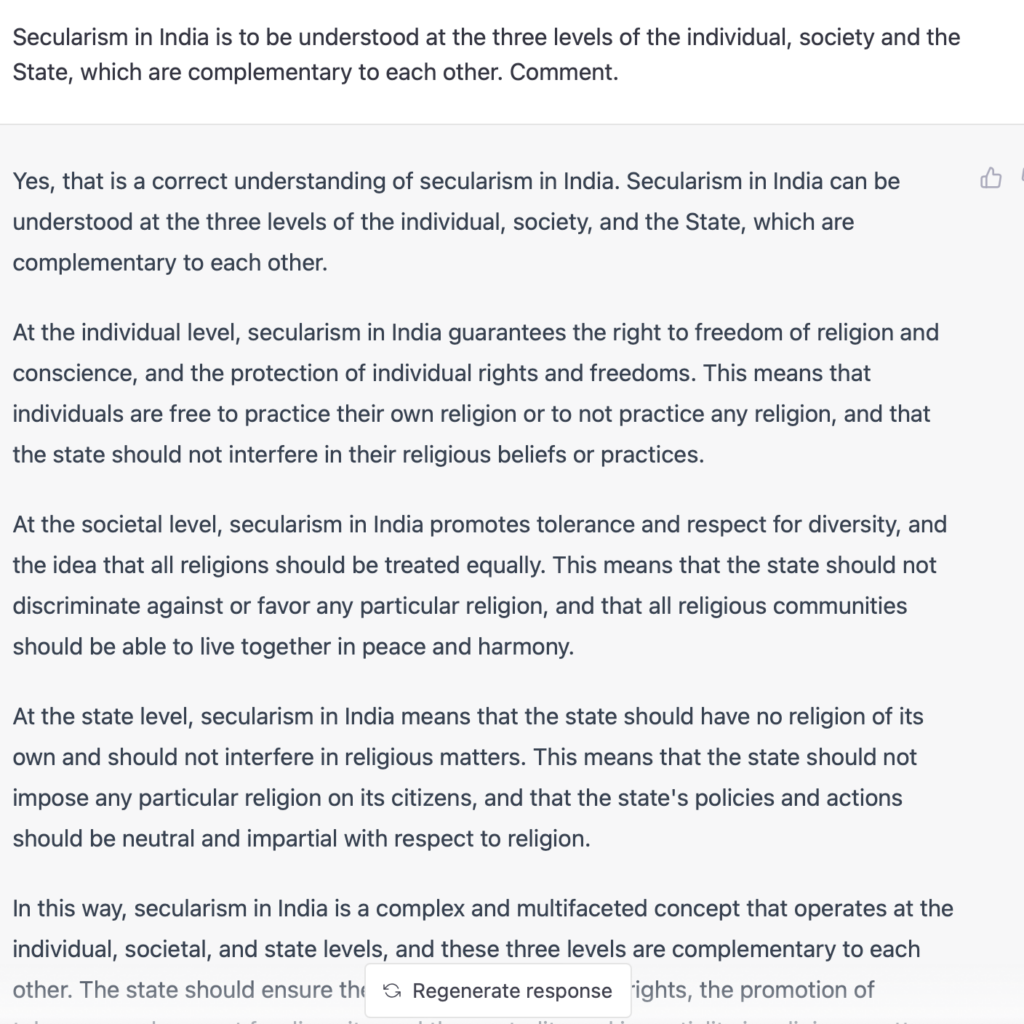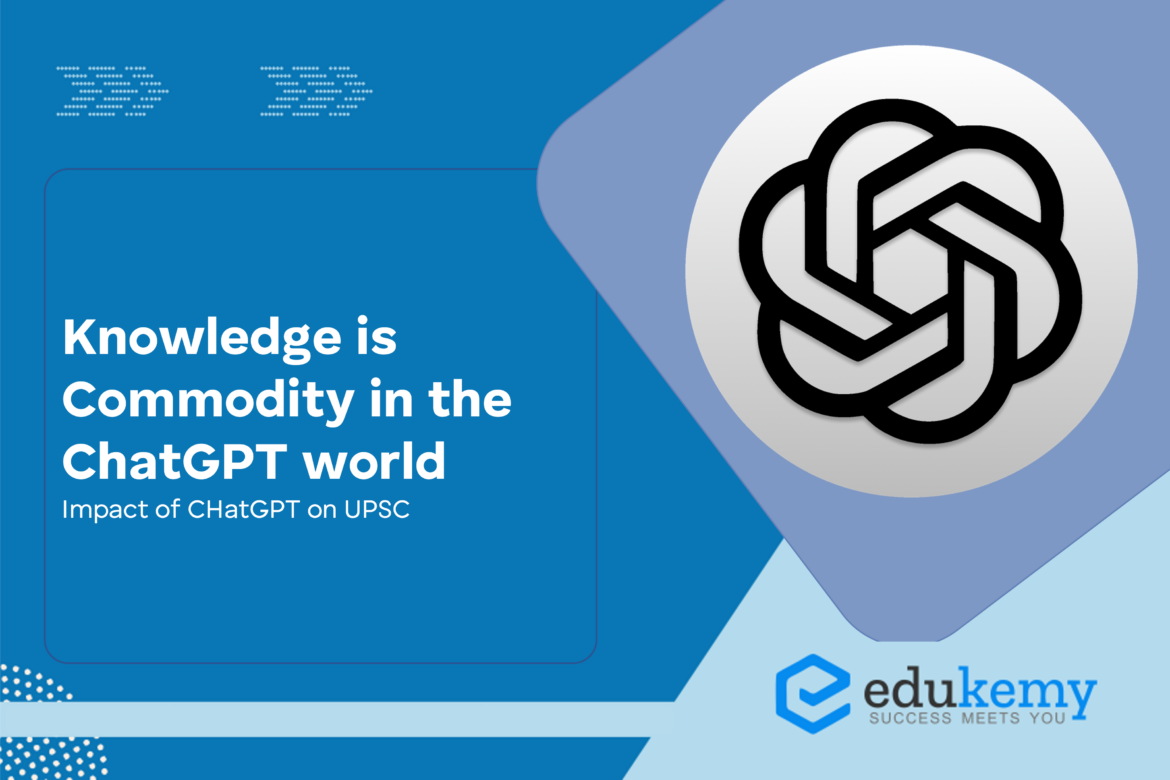
In the ChatGPT world, much like in the real world, knowledge is a valuable commodity, and the Universal Paper and Pencil Simulation (UPSC) serves as a testament to this notion. UPSC, standing for the prestigious Union Public Service Commission, is a revered institution that conducts one of the most challenging and comprehensive competitive examinations in India. It evaluates candidates on a wide spectrum of subjects, ranging from history and geography to current affairs and ethics. Success in the UPSC examination is not merely a demonstration of academic prowess but a reflection of a candidate’s depth of understanding and analytical abilities. In the ChatGPT world, where information is the currency that fuels conversations and interactions, a parallel emphasis on diverse knowledge domains mirrors the importance placed on a well-rounded intellectual foundation in the pursuit of excellence. Just as the UPSC shapes future leaders and civil servants, the acquisition and application of knowledge in the ChatGPT world empower individuals to navigate the digital landscape with wisdom and insight.
Contents
Advent of ChatGPT
Meanwhile, technology like ChatGPT is raising the bar for basic concepts like intelligence. It’s revolutionized knowledge and its application.
Take for example Secularism as a concept. Most coaching institutes will give you a huge dump of information about this subject. This will typically cover topics such as
- History of Secularism in India
- Article 25 of the Indian Constitution and Secularism
- Comparison between Indian vs Western Secularism
- Relation with Communal and Feudalism
Good stuff, yes? I asked ChatGPT about each of these topics. And I got extremely coherent and well-thought-out responses for each. They are long, about 100 words each and I will save you the trouble, but pls check it out at https://chat.openai.com/chat
ChatGPT in action – answering a UPSC question
And here’s an actual UPSC question on Secularism to drive home the point
Secularism in India is to be understood at the three levels of the individual, society, and the State, which are complementary to each other. Comment.
ChatGPT answer:

Existing content – rendered unnecessary!
ChatGPT continues to expound on our universe of knowledge to give us an astoundingly lucid summary. Like most of you, I was blown away. That gives you a good framework to answer this question, right? Not complete, but enough to get you started thinking about dimensions you may want to cover. Add some citations and facts, and you will have a pretty good answer.
BTW, I compared a model answer from a competitor’s website. Very similar to the above, obviously written by a content writer. Verified by some teachers and eventually uploaded to the web page. Now with ChatGPT, rendered completely unnecessary!
The application of knowledge has been truly democratized. Answering questions has never been easier. ChatGPT has certainly raised the bar. It’s great. But is it only as good as the questions asked to it? Is it limited by the framing of the question itself? Does anyone remember Hitchhiker’s Guide and the question to DeepThought around the meaning of Life? It whirred for a few million years and answered ’42’. Hilarious, but very pertinent.
Raising the bar for Intelligence
This is testing our basic intelligence, our depth of understanding. ChatGPT is already gone deep. Now that enables us to go deeper. We need to know what to ask. In a world of automated knowledge and application, The framing of the question will define the human being. UPSC will raise the bar going forward for sure. The future bureaucrat will not be the one who just knows stuff and can analyze it. Machines are doing that now.
The future ‘successful aspirant’ will have a vision and purpose, understand the nuances, can problem solve, resolve hard conflicts, work with dilemmas, and above all differentiate between cracking an exam and having a dynamic personality, deep understanding, clarity of vision and commitment to achieve them. This is why we made YUVA. It’s a reflection of what you need to succeed.
Ok, so,
- Where does this leave the standard YouTube commentator
- Where does this leave content creators and bloggers?
- What should Teachers teach now?
- What should classroom courses on Secularism look like?
I would love to hear your comments.
Read our Daily Blogs.
Frequently Asked Questions (FAQs)
Q: What is UPSC, and what does it stand for?
The Union Public Service Commission (UPSC) is a constitutional body in India responsible for conducting civil services examinations. It stands for the central recruiting agency for the Indian Administrative Service (IAS), Indian Police Service (IPS), Indian Foreign Service (IFS), and various other prestigious services.
Q: How can I apply for UPSC examinations?
To apply for UPSC examinations, candidates need to visit the official UPSC website and fill out the online application form during the specified application period. The process involves selecting the desired examination, providing personal details, educational qualifications, and uploading relevant documents. The application fee can be paid online.
Q: What are the eligibility criteria for UPSC exams?
Eligibility criteria vary depending on the specific examination. However, generally, candidates must be Indian citizens, hold a bachelor’s degree from a recognized university, and meet age requirements. There are relaxations in age limits for certain categories, and specific educational qualifications are required for different services.
Q: What are the stages of the UPSC examination process?
The UPSC examination process consists of three stages: the Preliminary Examination (Objective Type), the Main Examination (Descriptive Type), and the Personality Test (Interview). The Preliminary Examination serves as a screening test, while the Main Examination and Personality Test determine the final selection.
Q: How is the UPSC syllabus structured, and what subjects are covered?
The UPSC syllabus is extensive and covers a wide range of subjects. The Preliminary Examination includes subjects such as General Studies and Aptitude. The Main Examination consists of nine papers, including Essay, General Studies, and Optional Subjects. The syllabus covers diverse topics like history, geography, economics, science and technology, ethics, and current affairs, among others. Aspirants can choose optional subjects based on their interests and academic background.
In case you still have your doubts, contact us on 9811333901.
For UPSC Prelims Resources, Click here
For Daily Updates and Study Material:
Join our Telegram Channel – Edukemy for IAS
- 1. Learn through Videos – here
- 2. Be Exam Ready by Practicing Daily MCQs – here
- 3. Daily Newsletter – Get all your Current Affairs Covered – here
- 4. Mains Answer Writing Practice – here

